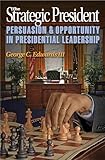The Strategic President : Persuasion and Opportunity in Presidential Leadership / George C. Edwards.
Material type: TextPublisher: Princeton, NJ : Princeton University Press, [2009]Copyright date: ©2009Description: 1 online resource (272 p.) : 18 tablesContent type:
TextPublisher: Princeton, NJ : Princeton University Press, [2009]Copyright date: ©2009Description: 1 online resource (272 p.) : 18 tablesContent type: - 9780691154367
- 9781400830015
- 352.23/60973 22
- online - DeGruyter
- Issued also in print.
| Item type | Current library | Call number | URL | Status | Notes | Barcode | |
|---|---|---|---|---|---|---|---|
 eBook
eBook
|
Biblioteca "Angelicum" Pont. Univ. S.Tommaso d'Aquino Nuvola online | online - DeGruyter (Browse shelf(Opens below)) | Online access | Not for loan (Accesso limitato) | Accesso per gli utenti autorizzati / Access for authorized users | (dgr)9781400830015 |
Browsing Biblioteca "Angelicum" Pont. Univ. S.Tommaso d'Aquino shelves, Shelving location: Nuvola online Close shelf browser (Hides shelf browser)

|

|

|

|

|

|

|
||
| online - DeGruyter Portfolios of the Poor : How the World's Poor Live on | online - DeGruyter A Necessary Engagement : Reinventing America's Relations with the Muslim World / | online - DeGruyter Playbooks and Checkbooks : An Introduction to the Economics of Modern Sports / | online - DeGruyter The Strategic President : Persuasion and Opportunity in Presidential Leadership / | online - DeGruyter The Art of the Public Grovel : Sexual Sin and Public Confession in America / | online - DeGruyter Patronizing the Arts / | online - DeGruyter Imagining Virginia Woolf : An Experiment in Critical Biography / |
Frontmatter -- Contents -- Preface -- CHAPTER 1. Power as Persuasion -- CHAPTER 2. Leading the Public: Best Test Cases -- CHAPTER 3. Leading the Public: Exploiting Existing Opinion -- CHAPTER 4. Leading Congress: Best Test Cases -- CHAPTER 5. Leading Congress: Less Favorable Contexts -- CHAPTER 6. Reassessing Leadership -- Notes -- Index
restricted access online access with authorization star
http://purl.org/coar/access_right/c_16ec
How do presidents lead? If presidential power is the power to persuade, why is there a lack of evidence of presidential persuasion? George Edwards, one of the leading scholars of the American presidency, skillfully uses this contradiction as a springboard to examine--and ultimately challenge--the dominant paradigm of presidential leadership. The Strategic President contends that presidents cannot create opportunities for change by persuading others to support their policies. Instead, successful presidents facilitate change by recognizing opportunities and fashioning strategies and tactics to exploit them. Edwards considers three extraordinary presidents--Abraham Lincoln, Franklin D. Roosevelt, and Ronald Reagan--and shows that despite their considerable rhetorical skills, the public was unresponsive to their appeals for support. To achieve change, these leaders capitalized on existing public opinion. Edwards then explores the prospects for other presidents to do the same to advance their policies. Turning to Congress, he focuses first on the productive legislative periods of FDR, Lyndon Johnson, and Reagan, and finds that these presidents recognized especially favorable conditions for passing their agendas and effectively exploited these circumstances while they lasted. Edwards looks at presidents governing in less auspicious circumstances, and reveals that whatever successes these presidents enjoyed also resulted from the interplay of conditions and the presidents' skills at understanding and exploiting them. The Strategic President revises the common assumptions of presidential scholarship and presents significant lessons for presidents' basic strategies of governance.
Issued also in print.
Mode of access: Internet via World Wide Web.
In English.
Description based on online resource; title from PDF title page (publisher's Web site, viewed 30. Aug 2021)


